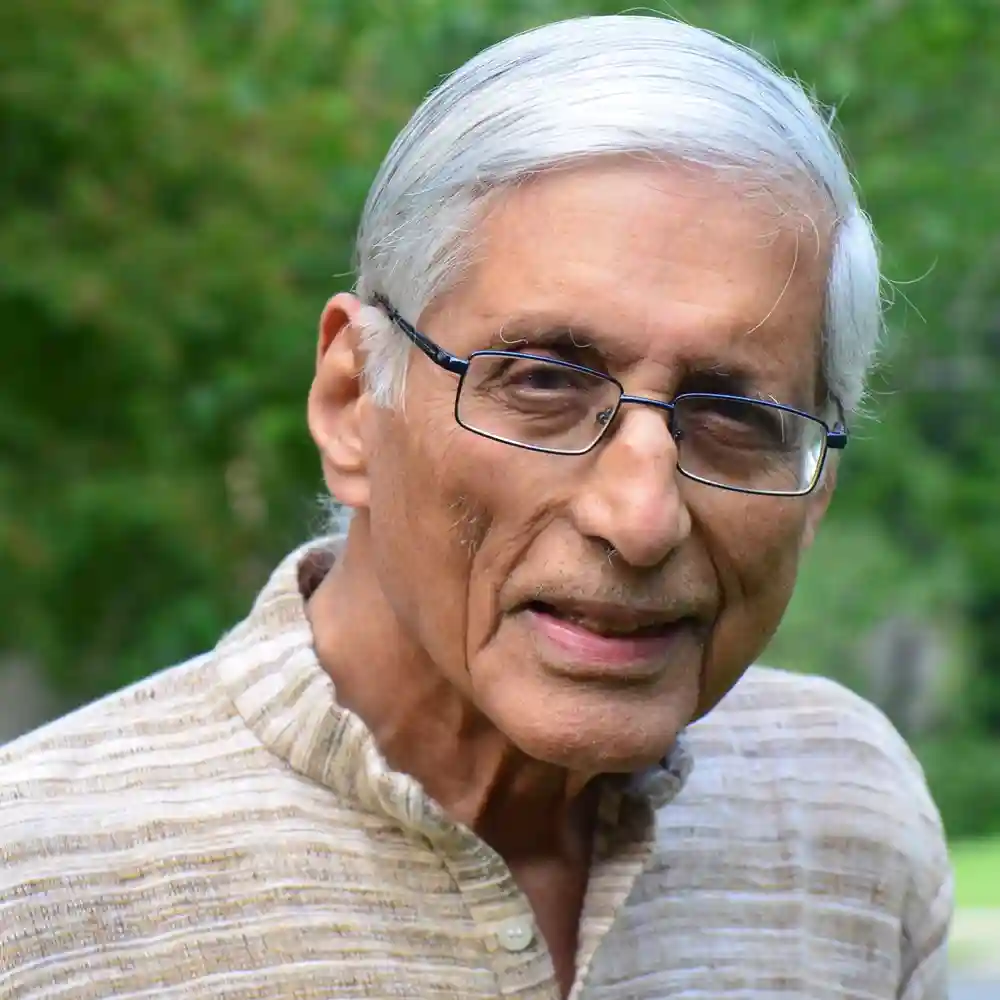Rajmohan Gandhi is a distinguished historian, biographer, journalist, peace activist, and former Rajya Sabha member, known for his lifelong commitment to communal harmony, politics, and historical scholarship.
Born on 7 August 1935 in New Delhi, Rajmohan Gandhi is the grandson of Mahatma Gandhi and C. Rajagopalachari—two pivotal figures in India’s freedom movement. Educated at St. Stephen’s College, University of Delhi, he began his professional career as a journalist and later transitioned into academia and public service. He taught at several institutions, including the Indian Institute of Technology (IIT) Bombay, IIT Gandhinagar, the Centre for Policy Research, New Delhi (1992–2000), Michigan State University, and the University of Illinois at Urbana-Champaign (1997–2022), where he held the title of Research Professor in South Asian and Middle Eastern Studies.
Rajmohan Gandhi has been involved with Initiatives of Change (formerly known as Moral Re-Armament) since 1956, serving as its President in 2009 and 2010. In the 1960s and early 1970s, he played a key role in establishing Asia Plateau, a centre in Panchgani, Maharashtra dedicated to ethical leadership and reconciliation.
In 1990, Rajmohan Gandhi was elected to the Rajya Sabha, where he served until 1992. That same year, he represented India at the United Nations Human Rights Commission in Geneva. In 1989, he contested the Lok Sabha elections against then Prime Minister Rajiv Gandhi from Amethi. Prior to that, he had also contested parliamentary elections from Jabalpur and Sabarkantha respectively. He joined the Aam Aadmi Party in 2014 and stood as a candidate in the general elections.
He began writing on democracy and human rights in 1964 when, along with a few friends, he co-founded the weekly magazine Himmat in Mumbai, serving as its Editor-in-Chief until 1981. He later became the Resident Editor of The Indian Express (1985–1987) and has written extensively for The Hindu, Hindustan Times, The Indian Express, The Wire, and other periodicals.
A prolific writer and historian, Rajmohan Gandhi’s writings cover the Indian independence movement, its leaders, Indo-Pakistan relations, human rights, and conflict resolution. His body of work includes landmark biographies of Sardar Vallabhbhai Patel, Mahatma Gandhi, C. Rajagopalachari, Khan Abdul Ghaffar Khan and Maulana Abul Kalam Azad. Notable publications include The Rajaji Story: A Warrior from the South (two vols. 1978 & 1984). Eight Lives: A Study of the Hindu-Muslim Encounter (1986), Understanding the Muslim Mind (1987), Patel: A Life (1991), Rajaji: A Life (1997), Ghaffar Khan: Nonviolent Badshah of the Pakhtuns (2004), Mohandas: A True Story of a Man, His People and an Empire (2006), A Tale of Two Revolts (2009), Punjab: A History from Aurangzeb to Mountbatten (2013), and Modern South India: A History from the 17th Century to Our Times (2018), among many others. Rajaji: A Life received the Sahitya Akademi Award in 2002, and Mohandas was awarded the Indian History Congress Biennial Award in 2007.
In 2017, Rajmohan Gandhi launched the website himmat.net to share his reflections on public affairs and contemporary issues. This initiative has since transitioned to a new platform, We Are One Humanity, where his regular column, How I See It, continues to offer insightful commentary on democracy, human rights, and current events.
Rajmohan Gandhi has received several honorary doctorates, including from the University of Calgary, Obirin University (Tokyo), Liverpool Hope University, Guru Nanak Dev University (Amritsar), and Michigan State University. In 2004, he received the International Humanitarian Award from the City of Champaign, USA. He presided over the Contemporary History section of the 78th Indian History Congress in 2017 and has served on juries such as the Nuremberg International Human Rights Award and the Centre for Dialogue & Reconciliation in Gurgaon.
Rajmohan Gandhi continues to write, speak, and engage with issues central to India’s democratic and political life. His writings can be accessed at weareonehumanity.org/rajmohan-gandhi.
About the collection: Rajmohan Gandhi has donated an invaluable collection of his private papers, spanning his distinguished career as a historian, biographer, journalist, and politician. This extensive material includes manuscripts of his books—Patel: A Life, The Good Boatman, The Rajaji Story, Eight Lives, and others—along with correspondence with research institutes and publishers, book reviews, articles, lectures, and printed materials, etc. The collection reflects Gandhi’s academic contributions in India and abroad, covering research on South Asian history, notable personalities, Gandhian thought, and peacebuilding. His political career and advocacy, particularly in Jabalpur, Sabarkantha, and Amethi are well-documented through campaign materials, posters, speeches, cassettes, pamphlets, and press coverage, highlighting his role in public discourse and governance. The papers also include bibliographies, research notes, Rajya Sabha reports, and volumes of Himmat magazine (Vol. 1-17). This collection serves as a vital resource for scholars studying modern and contemporary Indian history and political thought.
Second Installment, 2000-2024. These mainly relate to his academic activities in the USA, Canada and UK. There are copies of his lectures and talks delivered at various universities, also brochures, posters, pamphlets and CDs/DVDs. Besides, the instalment contains felicitation materials, certificates, articles, book reviews, and special issues of periodicals on Mahatma Gandhi.
Donor: Rajmohan Gandhi
Acquisition: 2025



